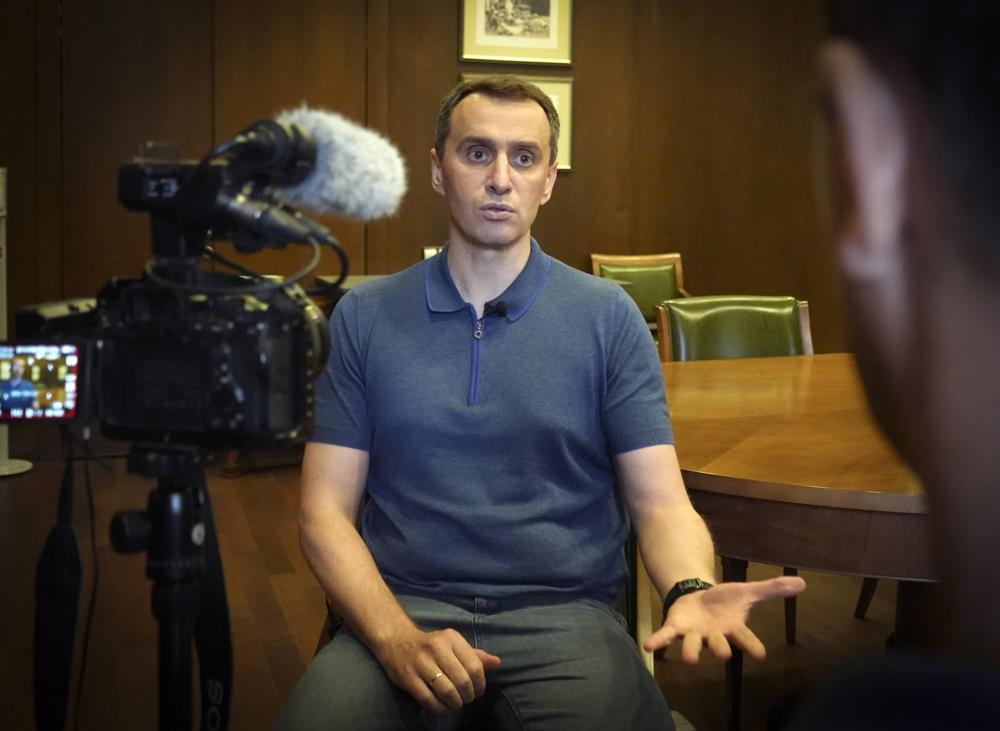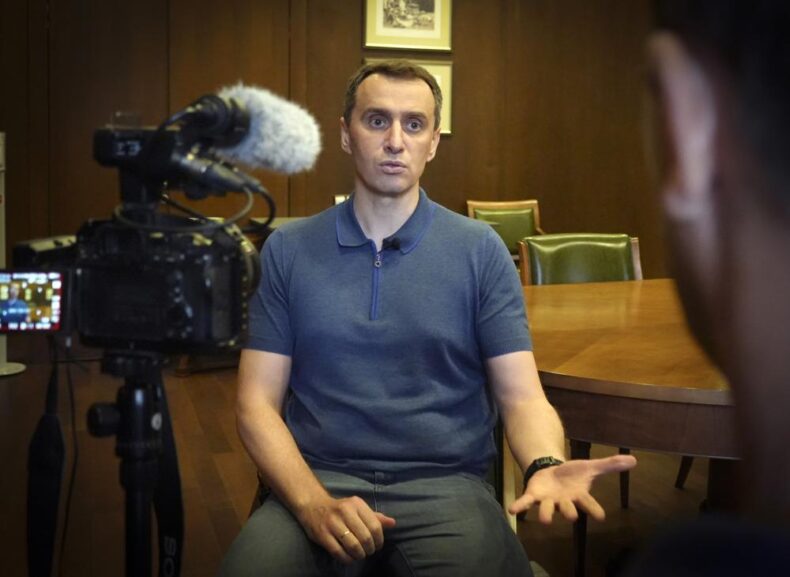On Friday, August 12, 2022, Ukrainian Health Minister Viktor Liashko talked with reporters from The Associated Press. Liashko accused Russian officials of preventing access to inexpensive medications in parts of Ukraine seized by Russia since the invasion began on February 24. He called the incident a “crime against humanity.”

On Friday, August 12, 2022, Ukrainian Health Minister Viktor Liashko talked with reporters from The Associated Press. Liashko accused Russian officials of preventing access to inexpensive medications in parts of Ukraine seized by Russia since the invasion began on February 24. He called the incident a “crime against humanity.”
On Friday, August 12, 2022, Ukrainian Health Minister Viktor Liashko talked with reporters from The Associated Press. Liashko accused Russian officials of preventing access to inexpensive medications in parts of Ukraine seized by Russia since the invasion began on February 24. He called the incident a “crime against humanity.” (Vasilisa Stepanenko/AP Photo).
Ukraine’s health minister Viktor Liashko has accused Russia of committing a crime against humanity by denying access to low-cost drugs in territory occupied by its troops since its invasion of the nation five and a half months ago. The Health Minister told The Associated Press that Russian officials had repeatedly thwarted efforts to supply state-subsidized medications to patients in seized cities, towns, and villages. “Russia has not (allowed) sufficient humanitarian corridors for us to give our own medications to the patients who need them for the entire six months of the war,” Liashko said late Friday at the Health Ministry in Kyiv. “We think that Russia is acting with intent, and we consider these actions to be crimes against humanity and war crimes that will be documented and recognised,” the minister added.
The Ukrainian government runs a programme that gives drugs to persons with cancer and other chronic illnesses. According to UN and Ukrainian officials, the destruction of hospitals and infrastructure and the relocation of an estimated 7 million people within the nation have hampered other types of treatment. The Ukrainian war had severely disrupted the country’s state-run health service, which was undertaking substantial changes in response to the coronavirus outbreak when Russian President Vladimir Putin ordered his soldiers to invade on February 24.
The state of Ukraine after the war
As of Aug. 11, the World Health Organization had registered 445 attacks on hospitals and other health care institutions, resulting in 86 deaths and 105 injuries. However, according to Liashko, the secondary consequences were significantly more severe. “When roads and bridges are damaged in areas currently held by Ukrainian forces,” he says, “it is impossible to bring someone who has suffered a heart attack or a stroke to the hospital.” “Sometimes we don’t make it in time, or the ambulance doesn’t arrive in time.” That is why conflict results in many more casualties (than those killed in the fighting). It’s an arbitrary figure.”
The supply of medicines stopped in Russia in 2013
In March, a spate of pharmaceutical companies, including those from the United States, France, Germany, Switzerland, and the United Kingdom, suspended non-essential medicine exports to Russia after its invasion of Ukraine while maintaining crucial medical supplies. According to the Financial Times, Eli Lilly said it would cease exporting pharmaceuticals such as Cialis, a therapy for erectile dysfunction, and suspend all investments, promotional operations, and new clinical studies in Russia. However, the US pharmaceutical company declared that it would continue to provide medicines for life-threatening ailments such as cancer and diabetes. Lilly stated that any revenues made from selling important medications such as insulin or cancer therapies would be given to humanitarian assistance operations.
Other pharmaceutical companies have likewise distanced themselves from Russia. Johnson & Johnson has stated that it will give humanitarian assistance to refugees in border nations and donate hygiene kits, health packs, and medical supplies. While it remains dedicated to supplying important health items to Russia, it no longer accepts new enrollments in Ukraine, Russia, or Belarus. Pfizer has pledged to donate any revenues from its Russian operations to direct humanitarian assistance for the Ukrainian people. However, it was noted that because medications are normally free from trade restrictions, they will continue to export important drugs such as those used in cancer therapy. Only the export of medications, the materials used to make them, and medical equipment have been exempted from Russia’s harsh sanctions. As a result, medicines and healthcare are among the few industries still conducting significant business in Russia.
Lundbeck, which specialises in depression therapies, stated that it would continue to assist patients in Russia who require drugs. “We will provide medicine to patients in Russia as long as we can do so under the present sanctions,” chief commercial officer Jacob Tolstrup stated in a written statement.
Read More – Ukraine And Polish Medical Staff Join Hands To Help Ukraine Refugees













